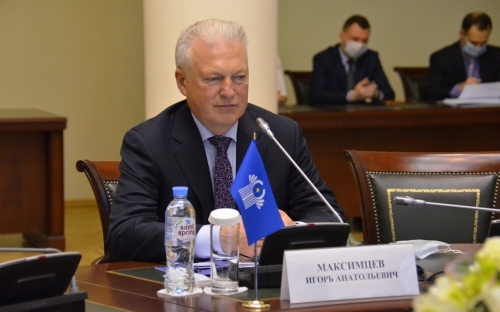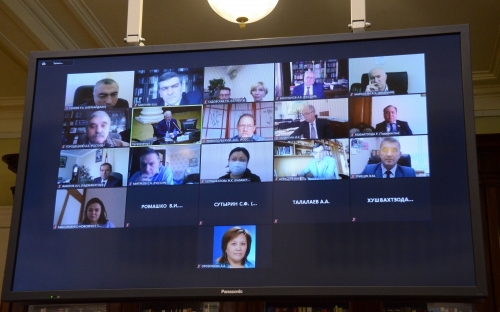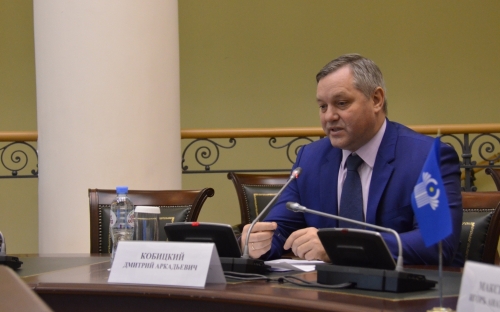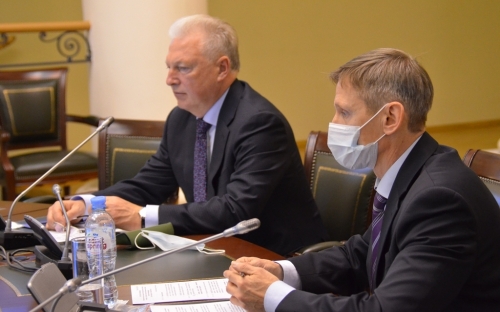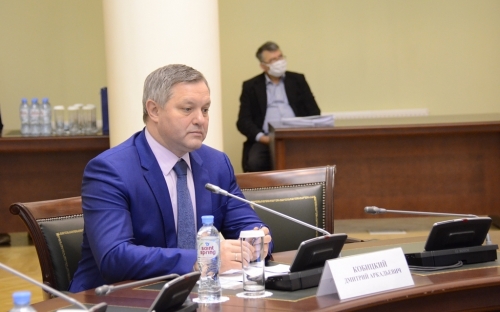In the Tavricheskiy Palace - that is the headquarters of the Interparliamentary Assembly of the Member States of the Commonwealth of Independent States - the meeting of the Expert Council on Economics under the IPA (INTER-PARLIAMENTARY ASSEMBLY) CIS (COUNTRIES of INDEPENDENT STATES) was held in the format of a videoconference.
The meeting was chaired by Igor Maksimtsev, the Chairman of the Expert Council on Economics at the IPA CIS, the Rector of St. Petersburg State University of Economics.
The event was attended by the following parliamentarians: the member of the Milli Majlis Committee on Economic Policy, Industry and Entrepreneurship, Doctor of Economics, Rufat Guliyev, and the member of the Majlisi Namoyandagon Majlisi Oli Committee on Energy, Industry, Construction and Communication, Doctor of Economic Sciences, Rustam Rakhmatzoda, both scientists and experts as well, then representatives of economic institutes of national academies of sciences, leading specialized universities of the Commonwealth countries, the Executive Committee of the Commonwealth of Independent States, and other organizations and departments.
Dmitry Kobitsky, the General Secretary of the IPA CIS Council, addressed the Council members with a welcoming speech. He noted that even in the current situation, complicated by the coronavirus pandemic, the Expert Council on Economics gathered at the meeting with almost its entire experts team, and expressed his hope for “an interested, fruitful discussion concerning possibilities of strengthening and developing the national economies of the Commonwealth Countries, overcoming the existing difficulties of the integration process on the CIS space ".
The meeting continued with a report by Valeriy Muntiyan, the Advisor to the Institute for Research and Expertise of Vnesheconombank, the Corresponding Member of the National Academy of Sciences of Ukraine, on the topic “Main Aspects of Ensuring the Economic Security of the Commonwealth States”. The scientist presented the comprehensive assessment of the economic security system of the CIS countries, taking into account the most pressing challenges and risks, as well as the factors accompanying the emergence of these threats: a drop in production, a decrease in income, and demographic crisis, etc.
“The fact that a meeting on the economic security of the Commonwealth states is being held at such a high-level platform indicates, firstly, that the Expert Council on Economics under the IPA CIS has a systematic vision of the problem and, secondly, it has the necessary knowledge on its complex solution, "- said the scientist.
Andrey Gorodetsky, the Head of the scientific direction "Institutes of Contemporary Economy and Innovative Development" of the Institute of Economics of the Russian Academy of Sciences, the Honored Scientist of the Russian Federation, Doctor of Economics, has shared his vision of the prospects for development and security in the post-crisis and post-pandemic world. According to him, “the COVID-19 pandemic and entering the global economic crisis that coincides with the end of the second decade of the 2000s is a double blow, which has turned out to be completely new and unexpected for national security systems, economic security systems, international security systems in general. ... The pandemic acted both as a special biomedical and demographic variety of a social humanitarian crisis, and at the same time both as a trigger and catalyst of crisis processes in conditions when the objective contradictions of the modern economy, social relations, came to the red line. "
“We need a plan for organizing and coordinating the recovery of national economies, renewal and adaptation of the CIS in relation to the emerging future post-pandemic and post-crisis world,” concluded Andrey Gorodetsky, identifying the model of lawmaking as one of the aspects of this plan. “It is necessary to make adjustments to the strategies for the development of health care and the mobilization capabilities of our states,” he added.
Igor Ilingin, the Director of the Economic Cooperation Department of the Executive Committee of the Commonwealth of Independent States, briefed the meeting participants on the main provisions of the CIS Economic Development Strategy for the period until 2030. He recalled that the document was approved on May 29, 2020 at the meeting with the Council Heads of Government of the Commonwealth of Independent States. The document, in particular, postulates that "in recent years, cooperation between the CIS member states has become an important factor in ensuring regional energy, food, environmental, technological security, as well as the security of infrastructure and cyber systems."
At the same time, it is noted that prospectively, until 2030, world economic processes will be characterized by increased uncertainty and instability, possible radical changes under the influence of geopolitical factors: “Among the main threats to maintaining positive economic trends are the escalation of trade protectionism, the imbalance of the multilateral trading system. A sudden and sharp tightening of global financial conditions and the associated risk of debt burden in both the private and public sectors could become a destabilizing factor.” The strategy fixes those areas (mutual trade, the fuel and energy complex, peaceful nuclear technologies, transport and its infrastructure, exploration and use of outer space for peaceful purposes, etc.), cooperation in which will help the Commonwealth countries to jointly overcome these challenges.
Professor of the Department of Economic and Financial Investigations of the Graduate School of State Audit, Moscow State University named after M. V. Lomonosov, Doctor of Economics, Alexander Molchanov, dwelled on the problems of ensuring the economic security of the CIS countries during the rational integration of the post-Soviet space in the context of the crisis. The scientist explained that "rational integration" means the integration of the Soviet Union based on a planned economy. In his opinion, it is the unification of the countries - heirs of the Soviet Union on similar principles that will help to ensure their economic security, and the Expert Council on Economics under the IPA CIS, in the scientist's opinion, can become a platform for creating an appropriate legal framework, which will facilitate, among other things, an early change structure of the economy of the CIS countries, without which it is impossible to talk about integration.
The Professor of the Department of Financial Management and Financial Law of the Moscow City University of Management of the Government of Moscow, the Honored Economist of the Russian Federation, Candidate of Economic Sciences Vladimir Alekseev and the Head of the Department of Human Capital Quality Management at the Corporate Energy University, Doctor of Medical Sciences, Professor, the Member of the Presidium of the Russian Academy of Natural Sciences, the Honored Worker of The Ministry of Fuel and Energy of the Russian Federation, Anatoly Talalaev, has commented upon the topic "Management of anthropogenic risks as a tool for managing human capital in the context of the economic security of the CIS." “Economic security is not only the protection of national interests, but also the readiness and ability of government institutions to create mechanisms for the implementation and protection of these interests,” Vladimir Alekseev explained and in his report he focused on the applied aspects of economic security, recognizing the management of anthropogenic risks as one of the main ...
Carrying on the meeting, the Director of the Belarusian Institute for System Analysis and Information Support of the Scientific and Technical Sphere, Viktor Grischuk, spoke about scientific and technological forecasting as the factor in the economic security of the CIS member states on the example of the work of the institute he heads.
The Head of the Department of International Economics, the Institute of Economics named after academician J. Alyshbaeva in the National Academy of Sciences of the Kyrgyz Republic, Azyk Orozonova, has highlighted the main problems of economic security in the Kyrgyz Republic. The Head of the Center for System Analysis of the Belarusian State Economic University, Advisor to the Rector of the Belarusian State Economic University, Candidate of Economic Sciences, Tatyana Sadovskaya, has presented to the council members the report on the topic “Transformation of the methodology for assessing the economic security of Belarus in the system of innovative development challenges”.
